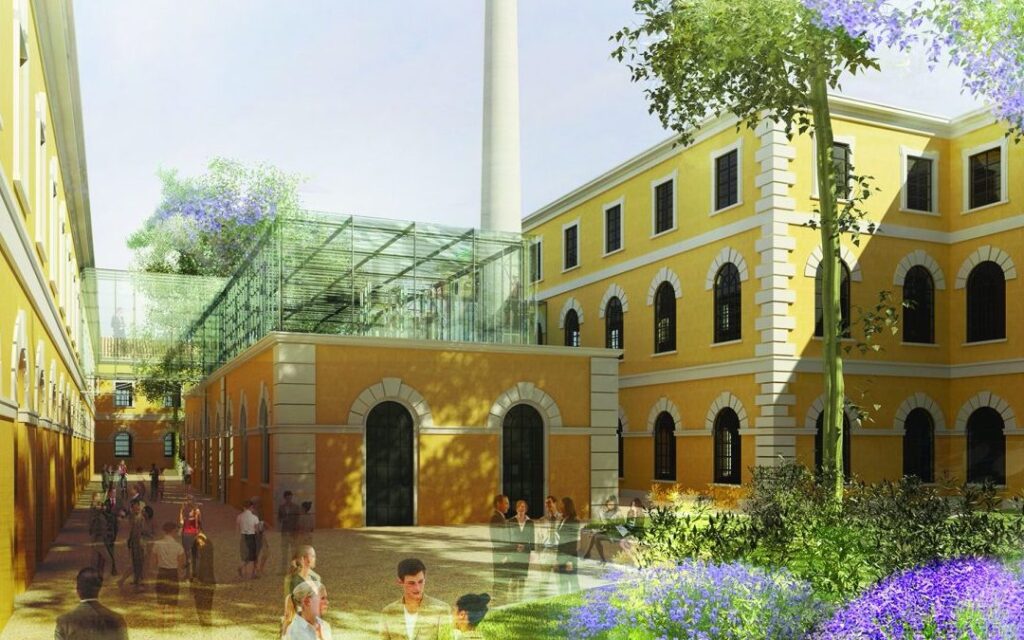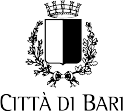Manifattura tabacchi
Historical photo: the “tabacchine”
Historical photo: the tabacchine at work
Historical photo of the former Tobacco Factory
Previous
Next
→ Expanded and modified over time, it soon became apparent that the factory’s urban location was less than adequate. This was in part due to a lack of indoor and outdoor space and of a convenient railroad line. More worrying, however, was the high rate of pollution caused by CO2 emissions, solid waste and fine dust. The situation was further worsened by the reduction in the employment rate as a result of a decrease in production.
It was therefore decided in the late 70s to relocate the production of cigarettes to the industrial district on the outskirts of Bari. With the inauguration of the new Production Plant on October 23 1982, the old factory in the heart of the populous and popular Libertà neighbourhood was declared officially closed.
THE FORMER TOBACCO FACTORY
The impressive industrial complex of the Tobacco Factory was built in the Liberty architectural style of design in 1913. Situated in the pulsing centre of the Libertà neighbourhood, its 40 thousand square metre surface is laid out in several buildings linked by walkways. Ahead of its time, the factory boasted a welfare system that included a canteen, kindergarten, nursery, cinema and a recreation centre for its employees.
A hundred male workers and a thousand female workers, called “tabacchine”, used to work there. The latter were employed because of their small agile hands, with which they made cigarettes and cigars. They were considered a symbol of female emancipation in the city: Luigia De Marinis, the first post-war female city councillor, was a member of their union. →
Aerial view of the former Tobacco Factory
Historical photo: the tabacchine at work
Previous
Next
The Tobacco Factory before regeneration works
DECOMMISSIONING
Over time, the factory became the subject of numerous hypothetical conversion projects until it was acquired in tandem by the University and the City of Bari. From 1997 to 2006, the building hosted the bunker courtroom for the maxi trial against Bari’s criminal clans. Following further restoration, the city administration in 1995 decided to allocate part of the building to the local fruit and vegetable open-air market. Inaugurated in 2001 with its market stalls, the former factory presently allows citizens to enjoy a space that until now was almost inaccessible to outsiders.
REGENERATION & REDEVELOPMENT
A century from its inception, the “Manifattura dei Tabacchi” has become a leading example of the ongoing urban renovation of the city of Bari and represents an outstanding opportunity for the Libertà neighbourhood.
Thanks to the acquisition of the shares owned by the University of Bari by the INVIMIT fund of the Ministry of Economy and Finance, the complex will soon house the new CNR Campus in Bari, hosting six research departments welcoming over 1000 researchers.
Pending project completion, the City of Bari has already recovered almost 3000 square metres of the complex establishing both the Porta Futuro job centre as well as the Houses of Emerging Technologies. These two offices offer career advice, consulting services for businesses and aid in the creation and development of start-ups in the technological and innovation sector.
All areas of the former Tobacco Factory that are not correlated to the CNR Campus project will continue to house a Food Market suitably redesigned and updated not only to sell fresh produce but to offer food consumption as well. The Police station will also remain for purposes of public safety.

Rendering for the venue of the Centre of National Research (CNR)
Campus CNR
The requalification project entails a new location for the Centre of National Research in Bari inside a portion of the former Tobacco Factory complex. The Research Centre is one of the largest CNRs in the country with its 17 institutes and 6 departments. This project is managed by Invimit, a publicly funded real estate investment group, on behalf of the CNR.
The idea behind this project is to concentrate various research centres scattered throughout the city into one single central location. This will further collaboration and exchange of ideas among diverse groups of researchers (physicists, chemists, ICT experts, agronomists, engineers). Proximity to the city’s new centres (Porta Futuro I and II) for career guidance and business development falls within the objectives of the project; all with the goal of imparting new knowledge and skills to businesses and making the CNR a regional landmark when it comes to research, development, and the spreading of knowledge.
The new campus will contain 189 experimental laboratories and host nearly 1,000 researchers. It will also include labs, libraries, classrooms and data processing hubs.
Not only will it become a research centre, but also one for training and aiding businesses on technological matters. Last but not least, the CNR will be popularising and raising awareness of STEM subjects for the benefit of schools and the local community.
Rendering for the venue of the Centre of National Research (CNR)
Porta Futuro
 The requalification of the Tobacco Factory by the City of Bari includes, on Via Ravanas, the Porta Futuro II building. This multifunctional service provider offers career guidance, business incubators, support for new start-ups, technological development directly from research to business and a one stop shop to promote local industrial development.
The requalification of the Tobacco Factory by the City of Bari includes, on Via Ravanas, the Porta Futuro II building. This multifunctional service provider offers career guidance, business incubators, support for new start-ups, technological development directly from research to business and a one stop shop to promote local industrial development.
These new headquarters cover two floors for a total of 2,500 square metres. The building boasts a reception and welcome area, career guidance spaces, multimedia classrooms, meeting rooms, information desks. All of this while closely collaborating with major local and national institutions such as Consorzio ASI, Puglia Sviluppo, Arti Puglia e INPS. Connections to training and research institutes are also guaranteed via web.
Porta Futuro II is also the site of the “Casa delle tecnologie emergenti dell’area metropolitana di Bari” (House of Emerging Technology of the Metropolitan Area of Bari). An innovation hub sponsored by the Ministry for Economic Development, it experiments with new technologies in the field of driverless and semi-driverless vehicles, aided by artificial intelligence and IOT technologies.
Research activities at the House of Emerging Technology
Workshop in the Porta Futuro building
Previous
Next









